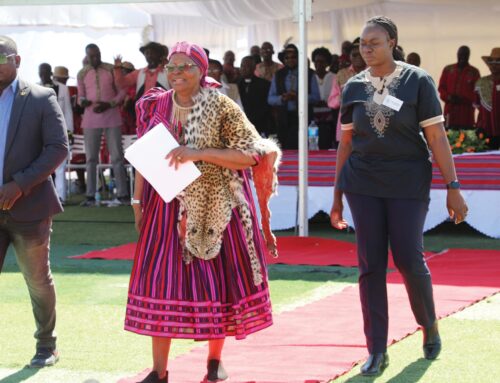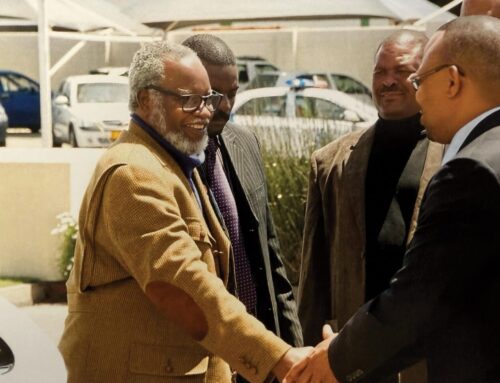CHANTELL HUSSELMANN
Chantell Husselman is the PwC Namibia Tax Leader. She leads the Firm’s Tax Department with a focus on a distinctive culture that attracts, develops and retains top talent, builds trust in society, solves complex client problems and has a positive impact on society. Chantell is a chartered accountant and has spent more than 20 years at the firm between the Assurance and the Tax Service Lines. She is an Indirect Tax expert, specialising in VAT and Customs and Excise consulting for the past 15 years. She is passionate about developmental programmes, knowledge sharing and is also the leading PwC Business School Partner. Chantell is a past president of the Institute of Chartered Accountants of Namibia (ICAN) and a former board member of the Public Accountants and Auditors Board.
This wise expression coined by philosopher Aristotle defines the today widely used concept of synergy. It echoes that together we achieve more. When pondering on the topic of Business Ecosystems, the concept nailed by Aristotle stuck with me and motivated me to focus on practical examples on how PwC Namibia embraces and fosters ecosystems, eventually leading me to dwell on how relevant and important the concept is to the entire Audit and Professional Service rendering profession.
Natural ecosystems were defined in the 1930s by British botanist Arthur Tansley to refer to a localised community of living organisms interacting with each other and their particular surrounding environment. Business strategist, James Moore, imported the concept to the interconnected world of commerce. He wrote in a 1993 Harvard Business Review article: ‘Successful businesses are those that evolve rapidly and effectively. Yet innovative businesses can’t evolve in a vacuum’.
At PwC, we believe that ecosystems accelerate learning, innovation and growth. Though we operate in a very regulated environment, being part of the larger society and operating in that mindset should be at the core of everything we do. This is emphasised by both our purpose which is building trust in society and solving crucial problems. Our core values are: act with integrity, work together, make a difference, and care and re-imagine the possible. In a small market such as the Namibian market, it is not financially viable to keep certain skills in-house on a full-time basis for PwC. This is especially so for highly specialised technical skills that are needed on projects that come by only once or twice every year, or even every second year. Skills such as engineering, for example, are not needed on a full time basis as the firm does not have many projects that would need such skills. To ensure that PwC delivers on projects that would require such skills, PwC makes use of sub-contractors for individuals or teaming-up agreements for companies.
Through a well-crafted, risk-averse and structured approach labelled Joint Business Relationships (JBRs) we are able to join hands with other corporates in tackling complex problems or delivering Thought leadership interventions to our clients, the business community or society at large. An example would be our annual hosting of the National Budget Gala Dinner in collaboration with the Minister of Finance, Standard Bank Namibia, Liberty Life Namibia and Namibia Media Holdings (Pty) Ltd. The event is well attended by business leaders, representatives from the government and the business community. Through this JBR, where each organisation plays a part, we have successfully managed to have the tabling of the National Budget analysed and timely communicated to stakeholders for over ten years. Through this event, the Minister of Finance as the main stakeholder has an opportunity on the day of tabling the National Budget to address the business community, reaching Namibian households with live streaming of the event and is available to take questions from the audience and viewers. At PwC we regard our role of analysing the announced budget and tax proposals as key to the JBR. We also use this opportunity to influence tax policy developments and contribute via the ICAN Tax Committee on various technical tax- related topics.
Another example would be our approach to delivering short-course training at the PwC Business School. Being relevant to our course offering, we find it imperative to engage with trainers/institutions outside our firm as opposed to only making use of PwC facilitators. As part of this strategy, in November 2019, the Business School signed a JBR with the Namibian University of Science and Technology (NUST). Through this JBR we are one step closer in our drive of firstly upskilling recent graduates and preparing them for the workforce and, secondly, we can join hands in keeping our nation informed and educated about relevant topics through hosting public lectures across a number of disciplines. PwC further collaborated with the Namibian Institute for Public Administration Management (NIPAM) to perform training sessions on corporate governance and fraud prevention to private sector and public sector attendees. PwC assisted with a facilitator for these training sessions, which they could not provide/present at the time.
Example number three would be our innovative Remchannel survey. With more than 100 local participant companies and over 60 000 data points, PwC’s Remchannel is the largest online salary survey in Namibia. Our cutting-edge survey system allows executives and human resources (HR) practitioners to make informed Namibian reward and strategy decisions using the system’s distinctive features. In this ecosystem, we need accurate and timely data from our participants and in return the participants can make their own informed decisions. We rely on accurate data by HR personnel who together with their relevant organisations are our collaborators. It is only with their support that such Namibian data can be made available to all other participants – this being an ecosystem where everybody must contribute in order to benefit.
With regard to skills development I focus on our commitment and continued efforts on interacting and engaging with local and South African higher institutions. This ecosystem assists PwC in attracting top talent but in the same breath ensures that these institutions and students are well informed about our bursary scheme, our service offerings and career opportunities. I also wish to acknowledge the University of Namibia (UNAM) Accounting Society (UNAS), the Public Accountant and Auditors Board ( PAAB) and the Institute of Chartered Accountants of Namibia (ICAN) for the roles they play in keeping students educated in the chartered accountant (CA) profession as an attractive career options- definitely making our job easier. In general PwC and many other audit firms invest significantly in training through tutoring at higher education institutions as this profession is one of the main exporters of Namibian skills. The upside to such cross-border mobility is the fact that these professionals can, upon their own choice, make use of their skills in another country, thereby acquiring valuable work experience.
PwC has various programmes and initiatives in place that are aimed at supporting future leaders at school level. These include the Omuhoko Trust Fund, the A.L.I.V.E initiative and the Back to School project. The Omuhoko Trust Fund has supported the educational development of underprivileged Namibians, through donations, training programmes and awareness campaigns. The fund is managed and driven by PwC staff who make voluntary monthly contributions to assist the communities we operate in. The Omuhoko Trust collaborates with various stakeholders when implementing its community projects. In the past year (2019/2020), the Trust’s A.L.I.V.E summer school, a youth empowerment programme aimed at helping learners improve their accounting and mathematics skills, and worked with top local teachers and the South African Memory Institute. This initiative saw 21 learners successfully complete the programme. The Omuhoko Trust Fund donated back-to-school hampers to the grade 1 learners of the Green Leaf Primary School to ensure they carry out their school activities effectively.
Furthermore, we have partners and managers that facilitate leadership and technical courses at the African Leadership Institute (ALI). ALI is run by former PwC Country Senior Partner Dawie Fourie to equip and develop leaders in Namibia. PwC collaborates with ALI by providing partners and managers to assist with lectures, course content and the setting and marking of examination papers.
As part of our Corporate Social Investment programme, PwC engaged the Namibian Police Force for its #KeepMeSafe campaign, by providing whistles for children to use in the event of danger or crime.
Being traditionally referred to as an audit firm, let us move the focus to the relevance of business ecosystems in strengthening audit quality. The International Federation of Accountants (IFAC) and the global accountancy profession are committed to continuous improvement and recognise the negative consequences of any audit failure.
IFAC sets out its recommendations for achieving high-quality audits. ‘Audits contribute meaningfully to the functioning of organisations, financial markets, andeconomies. While many thousands of audits are conducted each year without any issues, improvements are needed to ensure consistent high quality,’ said IFAC CEO Kevin Dancey. ‘This, however, cannot be achieved in a vacuum – all participants in the audit and assurance ecosystem must work together in striving to achieve high-quality audits 100% of the time. It is a vital part of our profession’s public interest mandate.’
In support to the above, three key factors identified by the USA-based Centre for Audit Quality to strengthen this ecosystem are:
- Commitment to continuous improvement, such as through the creation of resources for the auditing profession
- Collaboration with partners across the financial supply chain on key issues like strengthening audit committees and fighting fraud
- Policy engagement on top issues, such as the development of audit quality indicators, enhancing disclosure, and the debate over mandatory re-tendering and rotation.
All three points are very relevant and important to the Namibian audit profession, all companies subject to an external audit, and all audit committees/regulators tasked with the duty of protecting these companies and their stakeholders. In the Namibian context, it is critical to continuously focus on the need to strengthen internal controls and ethical leadership by companies, the need for regulators in Namibia to play a supportive and collaborative role instead of being a criticiser, and also the need for auditors to adhere to professional standards and behave ethically. The solution most often lies in approaching complex topics or decisions with both ownership and openness. These two traits are difficult to display simultaneously – but they are the key to navigating the gray.
Chantell Husselmann
Managing Partner
PwC Namibia
chantell.husselmann@pwc.com







